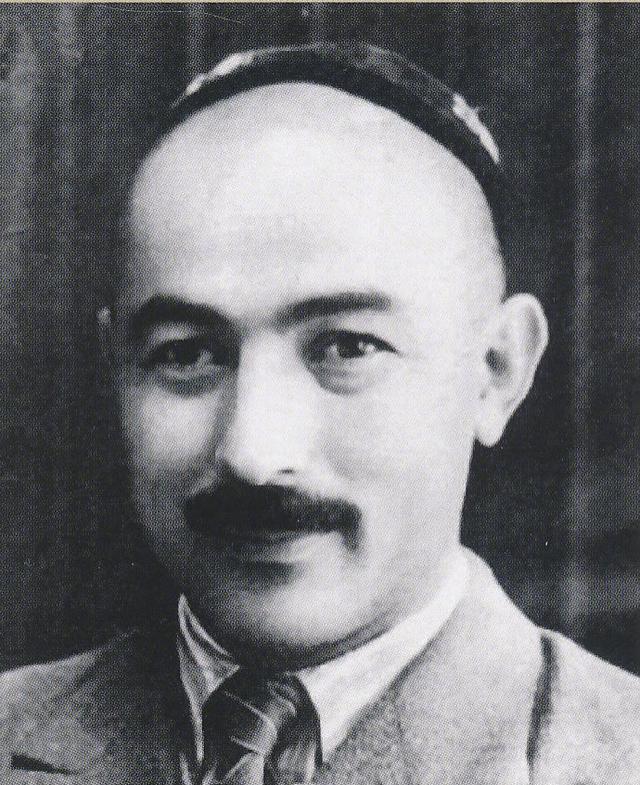#Heroic Martyrs #[Ahmad Tijiang Hasmu: Heroic Struggle for the Cause of Xinjiang People's Liberation] "Ahmadijiang and five other comrades fought bravely for the cause of the liberation of the Xinjiang people before their deaths, and finally sacrificed for the cause of establishing the People's Republic of China, which deserves the eternal commemoration of the people of the whole Chinese. On November 22, 1949, Chairman Mao Zedong commented on the leader of the three regions of Xinjiang, AhmadijAng Hasmu, in a telegram of condolence.

Ahmad Tijiang Hasmu, Uyghur, born in April 1914, from Yining, Xinjiang. As a teenager, he went to the Soviet Union with his uncle to earn a living, and in the summer of 1936 he entered the Moscow Eastern University, where he was educated in Marxist-Leninist ideology and returned to Yining in June 1942 to engage in secret work. In December 1943, he was arrested and imprisoned by the Kuomintang authorities in Xinjiang, and after his release in October 1944, he returned to Yining from Dihua (present-day Urumqi).
In November 1944, Ahmadijan Hasmu successively served as a newspaper editor, secretary of the "Provisional Government", and chief of the military section in the three districts of Xinjiang, and then entered the highest leadership of the three regions of Xinjiang and was promoted as a negotiator, waging a resolute struggle against the ethnic separatist forces in the three regions of Xinjiang headed by Eli Khan Tulie. In the end, he not only grasped the leading authority of the three regions of Xinjiang to hold peace talks with the Kuomintang central government, but also grasped the supreme leadership of the three regions of Xinjiang.
During this period, he attached great importance to safeguarding ethnic unity, opposing ethnic oppression and ethnic discrimination, and made significant contributions to the signing of the eleven "Peace Clauses" and the establishment of the Xinjiang Provincial Coalition Government. He said emotionally to the cadres and masses of all ethnic groups in the three regions of Xinjiang on many occasions: "Xinjiang is an integral part of China, and the three regions are an integral part of Xinjiang. Ili is the place where I landed, the place where our ancestors were buried, and China is our motherland and our hometown. ”
On July 1, 1946, the Xinjiang Provincial Coalition Government was established, and Ahmadijan Hasmu became the vice chairman of the Provincial Coalition Government. "Our task is to guarantee equality and unity among nations," he said. After the rupture of the Xinjiang provincial coalition government, he returned to Yining from Dihua and continued to lead the work of the three districts of Xinjiang.
On August 1, 1948, when Ahmadijan Hasmu presided over the establishment of the "Xinjiang League for the Defense of Peace and Democracy" (hereinafter referred to as the "New League"), he resolutely decided to adopt the name "Xinjiang".
In order to further reflect on and correct the serious mistakes made by the three regions of Xinjiang on the issue of state and ethnicity, he led the "New Alliance" to carry out ideological rectification within the scope of the three regions of Xinjiang, emphasizing that all ethnic groups in Xinjiang are equal and oppose discrimination against any ethnic group.
In order to cooperate with the national liberation work, Ahmad Tijang Hasmu vigorously publicized the CPC's propositions and the situation of the Chinese people's liberation war to the cadres and masses of the three regions of Xinjiang. He published articles such as "Our National Liberation Revolution and the New League," stressing that the future and destiny of the people of all ethnic groups in Xinjiang depend on the Chinese people's liberation war and on the leadership of the Communist Party of China. In a telegram to Chairman Mao Zedong, he said: "We believe that the great victory of the people's war of liberation is at the same time the victory of the people of the whole world and the whole of Xinjiang. Therefore, with the highest enthusiasm, we express our gratitude and excitement to our beloved Mr. Mao Zedong. ”
On August 23, 1949, at the invitation of Chairman Mao Zedong, he took the Soviet Union from Yining to Beiping (now Beijing) to attend the First Plenary Session of the Chinese Political Consultative Conference. (Xinhua Viewpoint reporter Liu Bing)